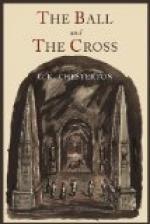“For Heaven’s sake, man,” he said, “don’t talk so much. Let other people have a chance (laughter). I trust all that you said about asking Mr. Turnbull to fight, may be regarded as rubbish. In case of accidents, however, I must bind you over to keep the peace.”
“To keep the peace,” repeated Evan, “with whom?”
“With Mr. Turnbull,” said Vane.
“Certainly not,” answered MacIan. “What has he to do with peace?”
“Do you mean to say,” began the magistrate, “that you refuse to...” The voice of Turnbull himself clove in for the first time.
“Might I suggest,” he said, “That I, your worship, can settle to some extent this absurd matter myself. This rather wild gentleman promises that he will not attack me with any ordinary assault— and if he does, you may be sure the police shall hear of it. But he says he will not. He says he will challenge me to a duel; and I cannot say anything stronger about his mental state than to say that I think that it is highly probable that he will. (Laughter.) But it takes two to make a duel, your worship (renewed laughter). I do not in the least mind being described on every wall in the world as the coward who would not fight a man in Fleet Street, about whether the Virgin Mary had a parallel in Mesopotamian mythology. No, your worship. You need not trouble to bind him over to keep the peace. I bind myself over to keep the peace, and you may rest quite satisfied that there will be no duel with me in it.”
Mr. Cumberland Vane rolled about, laughing in a sort of relief.
“You’re like a breath of April, sir,” he cried. “You’re ozone after that fellow. You’re perfectly right. Perhaps I have taken the thing too seriously. I should love to see him sending you challenges and to see you smiling. Well, well.”
Evan went out of the Court of Justice free, but strangely shaken, like a sick man. Any punishment of suppression he would have felt as natural; but the sudden juncture between the laughter of his judge and the laughter of the man he had wronged, made him feel suddenly small, or at least, defeated. It was really true that the whole modern world regarded his world as a bubble. No cruelty could have shown it, but their kindness showed it with a ghastly clearness. As he was brooding, he suddenly became conscious of a small, stern figure, fronting him in silence. Its eyes were grey and awful, and its beard red. It was Turnbull.
“Well, sir,” said the editor of The Atheist, “where is the fight to be? Name the field, sir.”
Evan stood thunderstruck. He stammered out something, he knew not what; he only guessed it by the answer of the other.
“Do I want to fight? Do I want to fight?” cried the furious Free-thinker. “Why, you moonstruck scarecrow of superstition, do you think your dirty saints are the only people who can die? Haven’t you hung atheists, and burned them, and boiled them, and did they ever deny their faith? Do you think we don’t want to fight? Night and day I have prayed—I have longed—for an atheist revolution—I have longed to see your blood and ours on the streets. Let it be yours or mine?”




